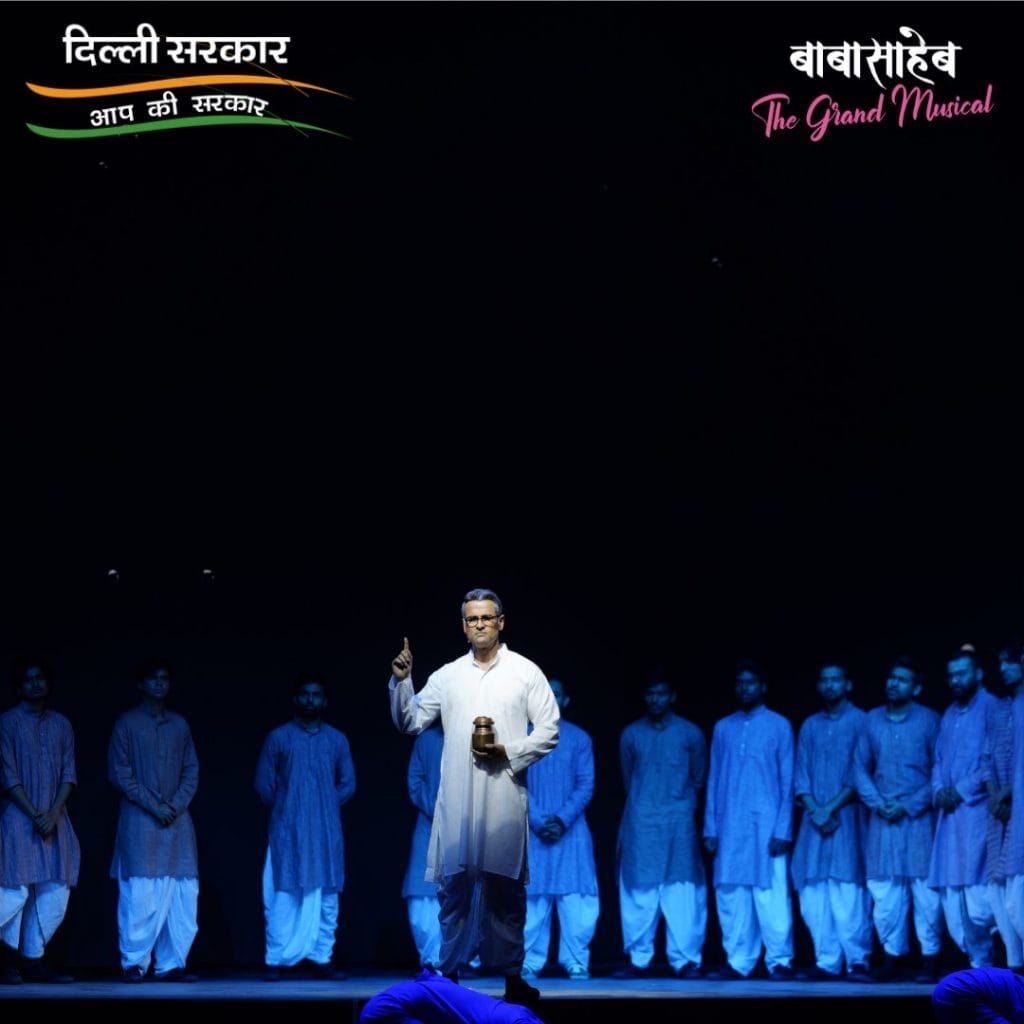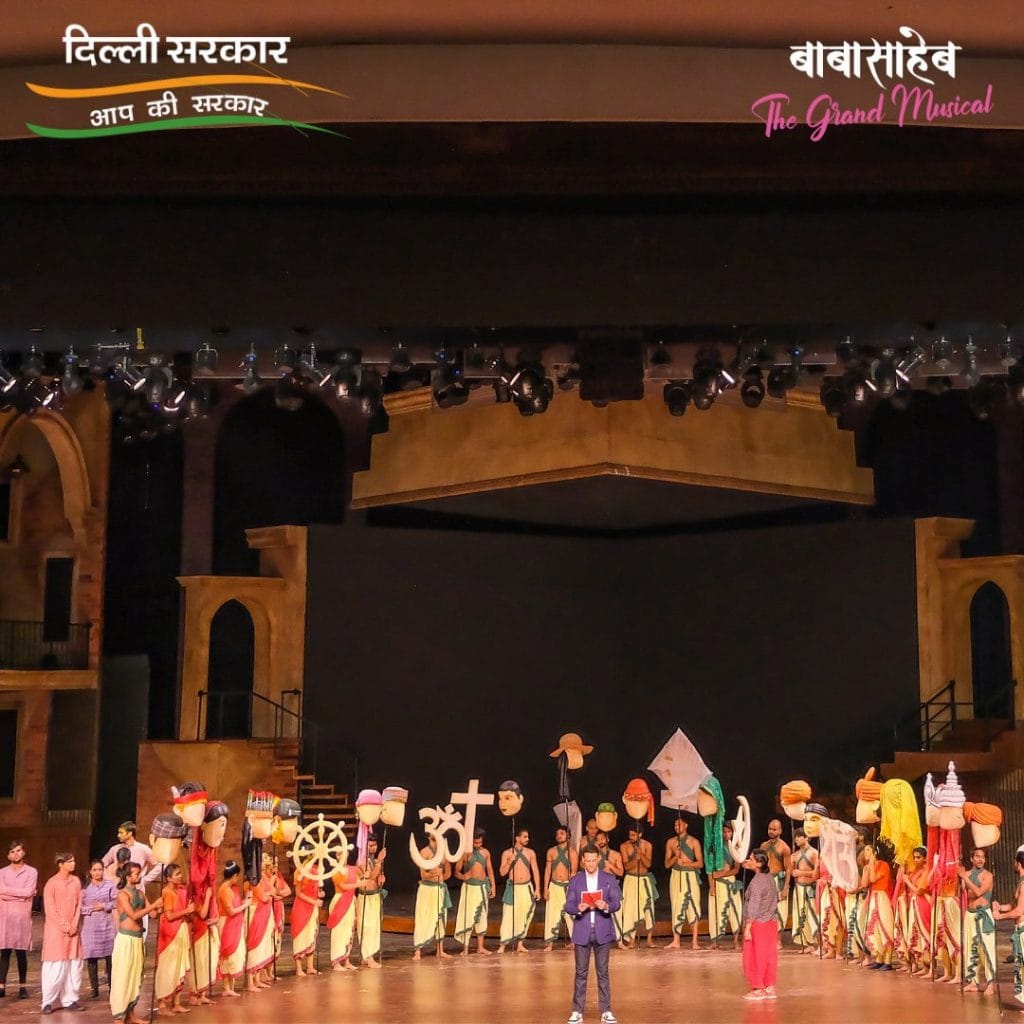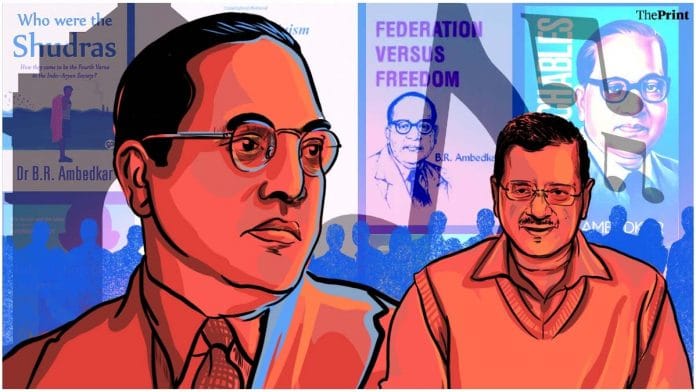The stage is dark, sombre music plays in the background, the 2,000 seats of the Jawaharlal Nehru Stadium are filling up. Then the giant digital screens flash two images at you – of BR Ambedkar and Arvind Kejriwal. Welcome to a two-hour-long musical in celebration of Ambedkar’s life – Babasaheb: The Grand Musical – and don’t forget that the Delhi government is its patron.
‘Who were the shudras’, ‘The untouchables’, ‘Federation versus freedom’, ‘The Annihilation of Caste’, ‘Riddles in Hinduism’ – the digital screens across the stadium light up with these phrases. You wonder if Ambedkar himself watched musicals – we do know he liked singing and dancing when in New York. But it’s an apt tribute to the man in a country obsessed with songs, dance and Bollywood.
Organised by the Delhi Tourism and Transportation Development Corporation, the musical offers a social commentary on the struggles of the Dalit community in colonial India. The musical, whose inaugural show was on 25 February, is being staged twice daily at 4 pm and 7 pm till 24 March, free of cost.
Director Mahua Chauhan’s 120-minute extravaganza is divided into two parts featuring defining moments of Ambedkar’s life — his childhood, experiences as a ‘Dalit’ lawyer, role in India’s freedom struggle, ideological differences with Jawaharlal Nehru and Mahatma Gandhi and his demise in 1956. The overarching narrative, however, is about the discrimination he faced because he was from the Mahar caste, a Dalit community predominantly from Maharashtra.
Teekam Joshi, the narrator of the musical, walks the audience through Ambedkar’s life set to the tune of rock band Indian Ocean’s compositions with Vineet Panchhi and Kausar Munir’s lyrics.
The packed shows almost always end with loud cheers and applause.

Also read: Was India’s Constituent Assembly too optimistic about the Executive? Read Ambedkar again
Propagation or appropriation?
Of late, the Aam Aadmi Party (AAP) government in Delhi has been focusing on historical idols in their communication and outreach, such as Dr B.R. Ambedkar and Bhagat Singh. While travelling in Delhi you are bound to come across advertisements of the Ambedkar musical in almost every neighbourhood — placards on street lights, bus stops and hoardings on highways.
“I appreciate the AAP government’s initiative to propagate Babasaheb’s life, work, philosophy, ideology,” said Professor Raj Kumar from the Department of English at Delhi University, who did his PhD on Dalit personal narratives.
However, he was quick to note that it wasn’t just about Ambedkar.
“This is also being used with a larger political interest. It is not just Ambedkar, there’s Savitribai Phule, Bhagat Singh, Ravidas. And I am not just talking about the AAP government, both the Centre and the state are trying to appropriate marginalised figures who were earlier little known and restricted to their communities. Celebrating jayantis (anniversaries) or through films is definitely appropriation,” he added.
Besides Ambedkar’s life and philosophy, Kumar thinks the Delhi government should focus on “structural changes”, much like what Babasaheb believed in.
“The taxpayers’ money could be used to institute annual fellowships to people conducting research on Ambedkar or scholarships to schoolchildren from marginalised communities,” he suggested.
Amit Kilam of Indian Ocean believes there are two aspects to a play such as this, depending on what “spirit” one wants to take it in. First, there is a “general dearth” of idolising historical figures, barring a few, from the Indian freedom struggle.
“Hamare desh ko banane wale toh bahut log hain na (There are many who made our nation)… We must make the younger generation aware of their stories too and let them decide for themselves whoever they want to follow.”
Kilam also underlines that in a country like India, it is “very difficult” to separate politics from issues of caste, religion, policy and development. But in spite of the overlap, he emphasises the need and relevance of such musicals or art forms focused on historical incidents.
“Only by learning about those will the children have a 360-degree view of what happened in the country else they’d be restricted to a myopic view of India’s history.”

Also read: Jhund is not just another sports film. It explores the ‘idea of India’ through Dalit eyes
The grand musical
Mansi Chauhan, a 19-year-old college student from Delhi University, came along with her classmates to watch the musical. Contrary to her expectations, she was impressed by the production quality.
“We were curious to see the show, although we had no expectations considering that it is organised by the government. But the grand scale they chose to celebrate Ambedkar was unbelievable,” she said.
With a 40-feet wide revolving structure at the centre, the 100-feet wide stage at the JLN Stadium transforms into Columbia University, Yerwada jail in Pune among other prominent locations, finally concluding with a 20-feet high statue of Ambedkar. The play, with Roshan Abbas as its creative director, meets a thunderous applause each time Ambedkar (played by Rohit Roy) takes a stand for himself – during his meeting with Gandhi at Yerwada jail to sign the Poona Pact, jal (water) satyagraha or reciting the Preamble to the Constitution.
A former government employee, who did not wish to be named, was gleefully clicking pictures as the audience gave a resounding standing ovation to the cast and crew after the play ended.
“I also belong to the same community as Dr Ambedkar. It brings me so much joy to see his life, work and philosophy being celebrated like this.”






